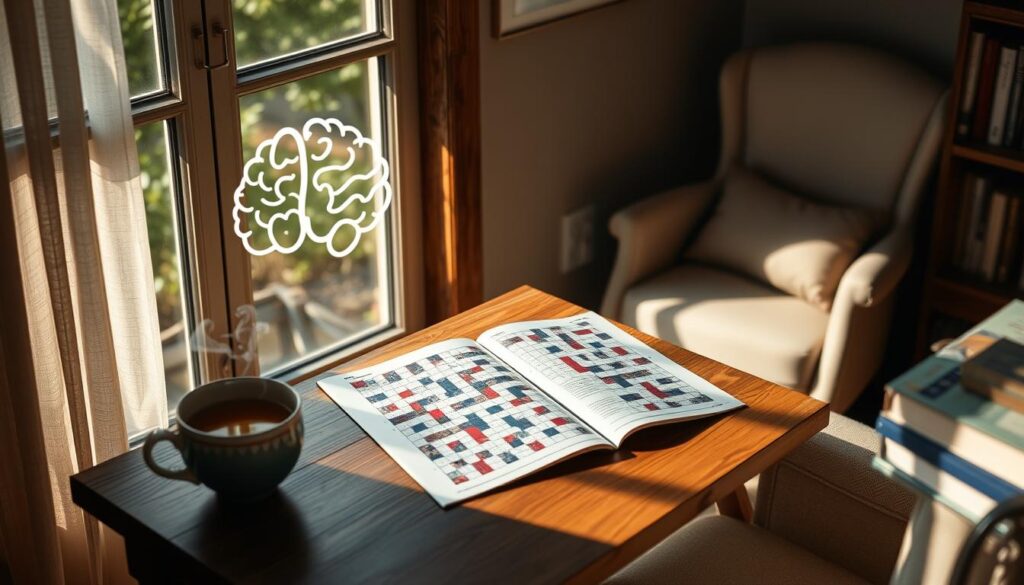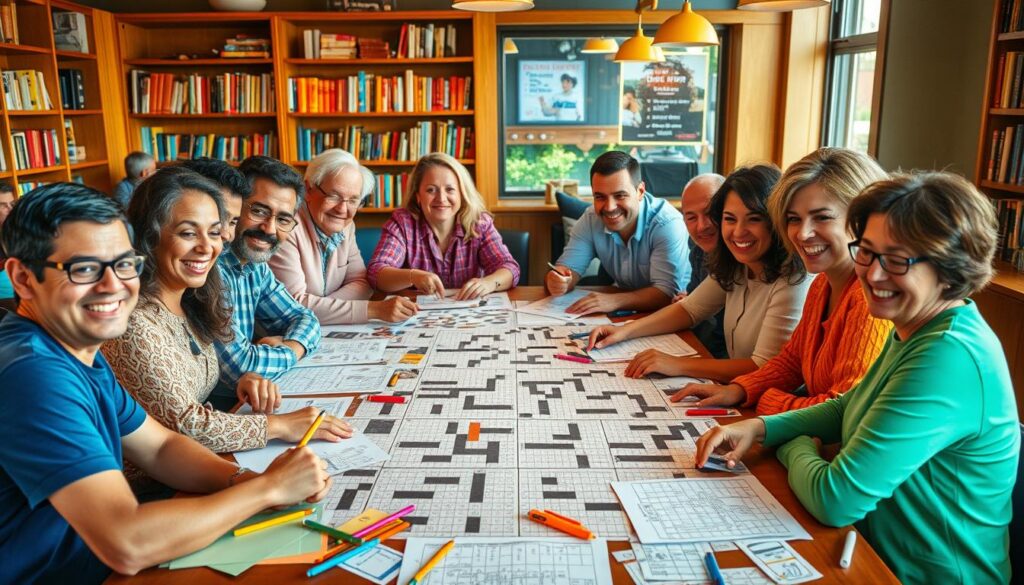Crossword puzzles now feel like chats about modern culture. Young people, like Emma, the author’s niece, love NYT puzzles. They see them as fun daily activities.
Crosswords have changed from testing old facts to expressing current ideas. This shift makes puzzles more personal and engaging for solvers.
New technology and online communities have changed puzzle-making. Efforts to include diverse constructors have also made a difference. Crosswords now offer a mindless way to work out your brain.
Solving puzzles helps improve problem-solving skills. It’s also a fun way to explore today’s world and culture.
Table of Contents
ToggleKey Takeaways
- Crossword puzzles have evolved from traditional trivia to more personal and expressive forms of engagement with contemporary culture.
- Younger generations like the author’s 20-year-old niece are actively participating in daily NYT puzzle games such as Connections, Mini, and Strands.
- Advancements in puzzle-making technology and the growth of online puzzle communities have influenced the crossword puzzle landscape.
- The NYT crossword offers a mindless yet captivating way to exercise the mind, flex problem-solving skills, and explore the zeitgeist of the modern world.
- Solving crossword puzzles can be a fun and stimulating leisure activity that provides cognitive benefits.
Introduction to the Mindless NYT Crossword
Crossword puzzles are a beloved pastime that keeps our brains active. The New York Times Crossword is a captivating challenge. It combines solving tricky clues with learning about culture, history, and trivia.
Explaining the Popularity of Crossword Puzzles
Crosswords offer many cognitive benefits. They improve memory and problem-solving skills. They also reduce the risk of cognitive decline.
The mindless aspect of crosswords adds to their appeal. It allows the mind to wander and find calm. People can work out mentally while exploring their experiences and emotions.
Highlighting the Unique Appeal of the NYT Crossword
The New York Times Crossword is more than a test of knowledge. It’s a personal journey through contemporary culture. Puzzle fans love unraveling hidden meanings and finding unexpected connections.
“The New York Times Crossword has a way of evolving from a mere test of obscure knowledge into a more personal and expressive form of engagement with contemporary culture.”
The Evolution of Crossword Puzzles
Crossword puzzles have transformed dramatically in recent years. They’ve shifted from tests of obscure knowledge to expressive forms of modern culture engagement. This change stems from puzzle-making technology advancements and increased constructor diversity.
Today’s constructors express themselves through their work. The puzzles now reflect a lively conversation with contemporary culture. This approach makes them more engaging and relevant to solvers.
From Traditional Puzzles to Modern Cultural Conversations
Crossword puzzles have evolved since their 1920s North American popularity boom. The New York Times initially resisted publishing them for two decades. Now, they’re a daily staple in the publication.
The Times’ crosswords mirror our changing cultural landscape. Constructors use them to explore modern themes and spark conversations. This approach keeps the puzzles fresh and engaging.
- Over ten million people in the U.S. were estimated to spend half an hour daily on crossword puzzles.
- The term “crossword puzzleitis” was coined to describe the obsession with crossword puzzles, leading to cases of divorce and physical assault.
- The New York Times acquired the popular online game Wordle for a figure in the “low seven figures” to enhance its subscription offerings.
Crosswords now appeal more to younger audiences. Many students include New York Times Games in their daily routines. These games, like Mini Crossword and Wordle, stimulate minds and build community.
“The puzzles on NYT Games serve as a gateway for younger audiences to engage with challenging intellectual puzzles.”
Crossword puzzles continue to captivate players of all ages. They’ve adapted to offer personalized, culturally relevant experiences. This evolution keeps the classic pastime fresh and exciting for new generations.
Mindless NYT Crossword: A Spirited Conversation
The mindless NYT crossword has transformed into a lively cultural exchange. It’s no longer just a test of obscure knowledge. Now, it’s a platform for constructors to share unique perspectives and experiences.
Today’s crossword explores contemporary themes and challenges societal norms. Constructors use their craft to inject humor and provoke thought. The puzzle has become a canvas for personal expression, engaging solvers on a deeper level.
“The crossword has become a canvas for personal expression, allowing solvers like myself to engage with the puzzle on a deeper level.”
This shift reflects broader changes in cultural engagement surrounding puzzles. Constructors aim to spark conversations and challenge the status quo. The mindless NYT crossword now explores experiences and emotions alongside the constructor’s artistic vision.
Tackling the latest mindless NYT crossword is more than just filling in blanks. It’s about engaging with underlying themes and nuances. The puzzle has become a shared experience and a platform for dialogue.
This refreshing shift has breathed new life into the crossword. It’s now a captivating part of my routine, offering more than just trivia recollection.
Diversity and Personal Expression in Puzzles
Crossword puzzles have changed thanks to more diverse puzzle makers. People from different backgrounds now create these word games. This makes puzzles reflect modern culture and personal views better.
The shift allows for more themes in crosswords. Ross Trudeau‘s puzzle about the Brontë sisters shows deep themes. These puzzles connect with solvers on a new level.
Cultural references like CHARLOTTE’S WEB, EMILY’S LIST, and AUNTIE ANNE’S improve puzzles. They make solvers feel represented and connected. New methods like data binning show creators’ skills.
These changes make crosswords more fun and challenging. They reflect the different views that shape our world. Puzzles are now a way to express oneself.
Solvers can now engage with content that matches their interests. This change has made crosswords more inclusive and engaging. It shows the rich cultural mix of our society.
“If I can fool a bug, I can surely fool a man. People are not as smart as bugs.”
– Charlotte’s Web
| Constructor | Relative Difficulty | Theme | Theme Answers |
|---|---|---|---|
| Ross Trudeau | Medium | The Brontës | CHARLOTTE’S WEB, EMILY’S LIST, AUNTIE ANNE’S |
Diverse crossword makers have improved cultural representation in puzzles. This has created a more engaging solving experience. Puzzles now reflect our society’s rich diversity.
Solving Techniques for the Mindless NYT Crossword
The New York Times crossword puzzle demands unique skills. Mastering crossword-solving techniques enhances your experience with both standard and Mini versions. Approach puzzles with an open mind for a rewarding challenge.
Embrace the “mindless” aspect of puzzle-solving. The “Mindless Followers” clue shows how crosswords push creative thinking. A playful attitude unlocks hidden meanings and boosts problem-solving skills.
Sharpen your eye for patterns and wordplay. Crosswords test vocabulary, associations, and language nuances. Learn common conventions like abbreviations and homophones to tackle cryptic clues effectively.
The NYT Mini Crossword presents a unique 5×5 grid challenge. Its compact format requires speed and adaptability. Quick pattern recognition and efficient word recall are crucial for Mini success.
Treat puzzle-solving as a mindful journey. Honing your techniques sharpens cognitive skills. It also opens a world of word-based joy and self-expression.
The Mental Benefits of Puzzle Solving
Regular puzzle-solving activities offer significant mental benefits. Completing crossword puzzles keeps your brain active and engaged. This cognitive stimulation can improve brain function and reduce the risk of age-related decline.
Cognitive Stimulation and Reducing Cognitive Decline
Crossword puzzles provide more than just a fun challenge. They offer cognitive stimulation that can help maintain mental sharpness. Studies show this is especially beneficial for older adults.
Puzzle-solving may delay the onset of age-related cognitive issues. These include memory loss and difficulty with problem-solving. The NYT crossword offers a unique blend of mindful and mindless diversion.
The NYT crossword challenges different areas of your brain. Its diverse clues range from history to pop culture. This comprehensive cognitive stimulation makes it an excellent choice for a mental workout.
“Engaging in regular puzzle-solving activities, such as completing crossword puzzles, can provide significant mental benefits.”
Make the NYT crossword part of your daily routine. You’ll enjoy the crossword puzzles mental benefits and boost your long-term cognitive health.

Integrating Crosswords into Your Daily Routine
Crossword puzzles can be a rewarding and mentally stimulating daily activity. Solve the New York Times crossword during your coffee break. Try the Mini crossword on your commute. Or set aside evening time for a challenging puzzle.
Regular puzzle solvers have stronger working memories than their peers. Crosswords keep the brain active and expand problem-solving skills. Many students enjoy crosswords as a stress-relieving activity that tests their knowledge.
Crosswords offer a break from digital distractions and social media. They provide a calming respite from everyday stimulation. Completing a puzzle can be motivating, especially for younger people embracing this timeless art.
Keep the NYT Mini crossword handy for quick sessions during breaks. Set aside time for larger, more complex crosswords. Try different formats and difficulty levels to find your preference.
Making crosswords part of your routine can be enriching. They provide mental stimulation and a sense of accomplishment. Crosswords offer a chance to disconnect from the digital world and enjoy puzzle-solving.
Exploring Different Crossword Puzzle Formats
The classic New York Times crossword puzzle remains a beloved tradition. However, the NYT Mini Crossword has gained popularity as a quick, accessible option. This compact 5×5 grid offers simple yet clever clues.
The Mini Crossword appeals to solvers seeking a short mental workout. It’s perfect for busy individuals who want to solve puzzles daily. Its user-friendly design provides a quick mental exercise.
The NYT Mini Crossword has become a favorite crossword puzzle format. It fits seamlessly into hectic schedules, offering a satisfying challenge in minutes.
The NYT Mini Crossword and its Appeal
The nyt mini crossword has gained popularity for several reasons:
- Compact 5×5 grid size, offering a concise and manageable puzzle experience
- Clever and straightforward clues that can be solved quickly
Provides a satisfying sense of accomplishment in a short amount of time
Accessible to solvers of all skill levels, making it a great entry point for beginner puzzlers
The NYT Mini Crossword fits perfectly into daily routines. It’s great for morning commutes or as a quick break from stress. Its compact format and engaging clues appeal to puzzlers of all levels.
Building a Crossword Puzzle Community
Crossword puzzle communities have become vibrant hubs for enthusiasts. They offer spaces for solvers to connect, share insights, and celebrate achievements. These communities thrive both online and offline.
Social media groups and local meetups bring puzzle lovers together. Here, they can discuss strategies, swap techniques, and bond over their shared passion. These interactions help improve solving skills and create lasting friendships.
These groups are now crucial to the crossword puzzle world. They foster a sense of shared experience and support. Enthusiasts can analyze puzzles or debate different formats in this inclusive space.

As crosswords grow in popularity, communities adapt to members’ needs. Specialized forums cater to specific puzzle types. Regional gatherings bring local solvers together for face-to-face interactions.
The community enhances puzzle-solving experiences for all skill levels. It creates a supportive environment that welcomes everyone. This thriving community will shape the future of crossword puzzles.
Crossword Puzzle Resources and Tools
Crossword puzzle fans have many resources to boost their solving skills. Online platforms and mobile apps cater to diverse needs. These tools make this brain-teasing hobby more fun and accessible.
The New York Times Crossword is a top online spot for puzzlers. It offers daily challenges and tricky Sunday editions. The site provides hints, solutions, and progress tracking.
Other websites serve the growing demand for crossword resources. XWordInfo and CrosswordClues offer insights into puzzle construction and solving strategies. Mobile apps like Crossword Puzzle and Word Games let you solve on the go.
Books and magazines are great for those who like paper puzzles. The New York Times Magazine, Games Magazine, and Penny Press Crosswords offer various puzzles. They also provide tips and community engagement for puzzle lovers.
These resources help both new and seasoned solvers improve their skills. You can explore the rich world of crossword puzzle solving with ease.
| Resource | Description |
|---|---|
| The New York Times Crossword | Iconic online destination for a wide range of crossword puzzles, from daily challenges to Sunday editions, with features like hints, solutions, and progress tracking. |
| XWordInfo | Website offering insights into puzzle construction, word origins, and solving strategies for crossword puzzle enthusiasts. |
| CrosswordClues | Comprehensive resource for crossword puzzle clues, solutions, and related information. |
| Crossword Puzzle | Mobile app providing a vast collection of crossword puzzles across different difficulty levels and themes. |
| Word Games | Mobile app featuring a variety of word games, including crossword puzzles, for on-the-go puzzle solving. |
Books and magazines can enhance your crossword puzzle solving experience. The New York Times Magazine, Games Magazine, and Penny Press Crosswords offer diverse puzzles. They also provide tips and community engagement opportunities.
“The beauty of crossword puzzles is that they’re a perfect blend of challenging and rewarding. With the right resources and tools, anyone can unlock the joy of puzzle solving and experience the cognitive benefits that come with it.”
Challenging Yourself with Advanced Puzzles
Advanced crossword puzzles offer a greater challenge for experienced solvers. These complex puzzles, like those in The New York Times, test knowledge and problem-solving skills. Tackling them expands mental abilities and brings deep satisfaction.
The New York Times Sunday Crossword is a prime example of an advanced puzzle. Its intricate clues and diverse themes challenge even seasoned solvers. Completing these puzzles provides a sense of accomplishment and personal growth.
The New York Times Acrostic puzzles offer an even greater challenge. Solvers must fill in crossing words and uncover a hidden message. This combination of linguistic skill and deductive reasoning tests mental agility.
Pursuing advanced crossword puzzles can be rewarding for seasoned puzzlers. It keeps the mind sharp and active while providing a sense of achievement. These intricate puzzles can spark a lifelong passion for wordplay and problem-solving.
| Feature | Word Swipe |
|---|---|
| Market Focus | Mobile |
| Gameplay Mechanics | Swipe letters to form words |
| Difficulty Levels | Increasing challenge |
| User-Friendly Design | Hints and assistance |
| Target Audience | All ages, family-friendly |
| Key Objective | Complete puzzles with few words |
| Educational Value | Learning new words and usage |
| Player Engagement | High, hours of entertainment |
| Mental Benefits | Cognitive stimulation and stress relief |
Conclusion
The New York Times crossword has transformed into an engaging cultural conversation. It’s no longer just a test of obscure knowledge. This change comes from improved puzzle-making technology and diverse constructors.
“Mindless nyt crossword” puzzles offer many benefits to solvers. They provide mental exercise, problem-solving satisfaction, and social connections. These puzzles are part of a thriving community.
Crossword enthusiasts can find lifelong enjoyment in this pastime. It offers intellectual challenges and personal growth opportunities. The New York Times crossword continues to captivate readers with clever clues.
This puzzle sharpens vocabulary and problem-solving skills. It provides a stimulating mental workout for solvers. The “mindless nyt crossword” offers a delightful escape from daily life.
Crosswords are a platform for cultural expression. They reward both seasoned solvers and newcomers. Adding this pastime to your routine can bring cognitive benefits and satisfaction.
FAQ
What is the appeal of the NYT crossword puzzle?
The NYT crossword puzzle has evolved into a personal form of cultural engagement. It offers a mix of mindful and mindless diversion. Solvers learn about culture and history while exploring their own experiences.
How have crossword puzzles changed in recent years?
Crossword puzzles have shifted from testing obscure knowledge to engaging with modern culture. This change is due to improved puzzle-making technology and online communities. Increased constructor diversity has also played a role.
What are the benefits of solving crossword puzzles?
Crossword puzzles can improve cognitive function and reduce the risk of mental decline. Deciphering clues and recognizing patterns keeps the brain active. This mental stimulation helps maintain cognitive health.
How can I incorporate crossword puzzles into my daily routine?
Try solving the NYT crossword or Mini Crossword during your coffee break. Set aside time each day for puzzle-solving. Regular practice can improve your problem-solving skills and boost personal satisfaction.
What resources are available for crossword puzzle enthusiasts?
Crossword enthusiasts have access to various online platforms and mobile apps. Books, magazines, and websites dedicated to crosswords are also available. These resources offer daily puzzles, hints, solutions, and community engagement opportunities.
How can I challenge myself with more advanced crossword puzzles?
Tackle complex puzzles found in publications like The New York Times. These advanced puzzles push the boundaries of your cognitive abilities. They offer a deeper sense of satisfaction and help expand your mental faculties.

